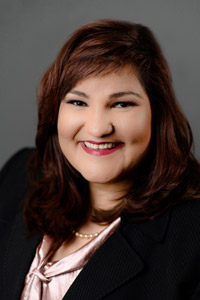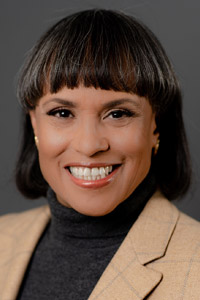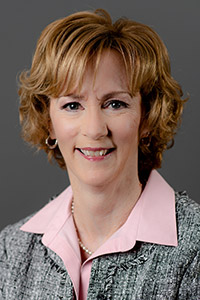In February, just two weeks after Kamala Harris was sworn in as the first female vice president, a portrait of her stood on display near the steps of the Lincoln Memorial. The installation, created by Simon Berger, used broken glass as a medium. It was an homage to the latest shattering of the "glass ceiling."

At NeighborWorks America, a congressionally chartered and funded nonpartisan nonprofit with an operating budget of nearly $190 million, women in the C-suite is not a rarity; it's part of the organization's fabric. While NeighborWorks isn't the only organization with three women in top leadership positions, consider: According to Business Insider Magazine, only 8% of Fortune 500 companies were led by CEOs who identify as women last year. In the nonprofit world, the number of women in the C-Suite rises considerably, but at U.S. nonprofits with budgets of more than $50 million only 18% of CEOs identified as women. And when it comes to organizations with more than one woman in the C-suite, the number declines once again.
Marietta Rodriguez, president and CEO of NeighborWorks America, Susan M. Ifill, NeighborWorks' executive vice president and chief operating officer, and Rebecca Bond, executive vice president and chief financial officer, have guided NeighborWorks America through a long and unprecedented year that has required new and innovative leadership. They let us listen in as they talked about a wide range of topics, reflecting on their paths to leadership, their mentors, working together, and how they came to NeighborWorks America.
In observation of Women's History Month, NeighborWorks is taking a moment to highlight our leaders, three women who are leading and growing our organization through a historic period.
"I envision a time when this isn't noteworthy; it just is," Rodriguez said of the organization's leadership. "Where opportunity exists for women, women of color, and it's not so novel."

Capri Cafaro, who lectures at American University in the Department of Public Administration and Policy, says the choice of a leader sets a tone for an organization. Women in decision-making positions, like those in a C-suite, political leadership or any other type of leadership, often bring a solution-oriented, collaborative approach to leadership. "In my experience, women try to engage the team in a way that's inclusive and maximizes the talent of individuals for the greater good of an organization," she says.
Rodriguez, Bond and Ifill certainly try to maximize talent, both in the organization and when they engage with others, outside it. They forge new partnerships to strengthen communities while working closely with one another.

"None of us are afraid to express an opinion," Ifill added. "You need to have people in your life who will tell you your flowers aren't as rosy smelling as you think they are."
Rodriguez said all three women feel a sense of extra responsibility in their roles because of their gender. "I think people inside and outside the organization watch us with a different level of scrutiny," she said.
NeighborWorks has always been ahead of the curve when it comes to women in leadership. In the 1960s, Dorothy Richardson, who galvanized her neighbors in the Central Northside neighborhood of Pittsburgh to fight for resources they needed to save their homes and community, was the one out in front. Her example became the community development model that became "Neighborhood Housing Services," which led to Congress creating the Neighborhood Reinvestment Corporation, now known as NeighborWorks America, to carry on the work of the task force.
Though Ifill's hiring in January 2020 marks the first time there have been three women in the C-suite, women have held top leadership positions at NeighborWorks in the past. Ellen Lazar broke ground serving as executive director from 2000 to 2003. Eileen Fitzgerald, now head of Housing Affordability Philanthropy at Wells Fargo, served as CEO from 2011 to 2014. Rodriguez became president and CEO in 2018.
Cafaro, who served as minority leader in the Ohio State Senate and counts women in politics and leadership among her areas of expertise, says we are seeing increased longevity of women in the national workforce. They start their careers earlier and reach higher levels. Accompanying that, she says, is a great deal of mentorship to help the next generation.
"In the workforce, we're seeing more role models and mentors; we're seeing more women pushing back and trying to take their rightful place in C-suits and other leadership positions across the country." But despite higher positions in government and more female CEOs, she says, "we're not seeing a 50-50 split anywhere. There's still quite a bit of work that needs to be done as far as achieving equity for women in leadership in major organizations." Change is incremental, she says. "But I'm eternally optimistic."
Holly Goodhart, director of digital marketing & communications for Network of Executive Women, a nonprofit focused on creating gender equity in the workplace, says that during a tumultuous year with hate crimes in headlines, she's seen organizations deeply committed to providing support for women of color in executive roles. "We're definitely seeing a building of diversity on teams and in leadership suites and boards," she says. "That aspect is definitely promising. But it hasn't gone far enough fast enough."
Meanwhile, with COVID-19, millions of women have left the workforce, many to become full-time caregivers for family members. That's expected to take women advancing in the workplace back 10 years, Goodhart says, "by taking them out of the workforce, out of the pipeline to be advanced into leadership positions."
At NeighborWorks, the leadership has remained steady through COVID-19. So has the staff, with employees sometimes working flexible hours to juggle children at home. Rodriguez, Ifill and Bond have all said their goal is to continue to reach back and help the women coming up behind them. "We have a responsibility to make sure they are supported and can see what's possible," Rodriguez said.

